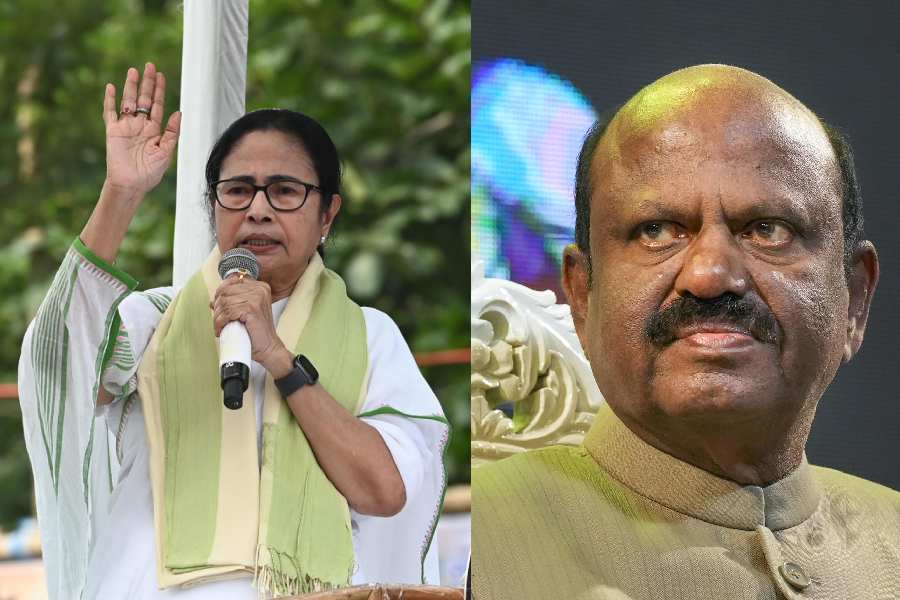Chief minister Mamata Banerjee went to Raj Bhavan on Monday and discussed with governor C.V. Ananda Bose, also the chancellor of state-aided universities, ways to solve what she called “pending problems” over the appointment of full-term vice-chancellors.
Mamata called on Bose three days after the Supreme Court asked the governor and the chief minister to sit across the table and thrash out their differences over the appointment of vice-chancellors of state universities.
“It was a good meeting. As you all saw, we discussed for close to an hour how to solve the pending problems. I think the way the discussions have progressed, it should not trigger any controversy and confusion,” the chief minister told reporters after stepping out from the meeting.
“Many of you talk about differences between the state government and Raj Bhavan. I think nothing could be better than mutual dialogue, as suggested by the Supreme Court.”
A Supreme Court bench headed by Justice Surya Kant had on Friday asked attorney-general R. Venkataramani, appearing for the governor, to use his “good offices” to
find a solution to the vexed issue by suggesting to the constitutional authorities to resolve the matter across the table.
The state government had in August moved the apex court, challenging the chancellor’s authority to appoint officiating VCs while disregarding the state’s initiative to appoint full-term VCs through a five-member search committee.
“We spoke about the five-member committee. There is one phase, which is about appointing temporary vice-chancellors. The other one is about what is being fought in court. This one is about the five-member committee. A bill on this was passed in the Assembly,” the chief minister said.
“Before the bill was passed in the Assembly, an ordinance that the governor had signed was promulgated. Therefore, there are no differences between us. We discussed it in detail and both of us agreed on something.... I cannot disclose all the discussions. I think the meeting was good.”
On May 15, the state government had promulgated the West Bengal University Laws (Amendment) Ordinance, 2023, to constitute a five-member search committee that would include a nominee of the chief minister and recommend a panel of names to the governor for the appointment of a vice-chancellor.
The conflict between the government and Raj Bhavan turned so acrimonious that the chief minister on theoccasion of Teachers’ Daysaid she would resort to “economic sanctions” as part of a “tit-for-tat strategy” if colleges and universities acted in deference to what the governor says.
“If you (the chancellor) decide to interfere in colleges and universities and if the colleges and universities act in deference to what you say, then I would resort to economic sanctions. There won’t be any compromise on this. Tit-for-tat. Then I would like to see how you pay the salaries of college teachers, how you pay the salaries of university teachers,” Mamata had said on September 5.
On June 12, days after chancellor Bose had appointed 11 officiating VCs to state universities allegedly without consulting the education department, the department in a communication to the VCs had said: “The appointment of vice-chancellor cannot be accepted as a valid appointment and therefore the state government does not accord the financial sanction about pay and allowance for the position of vice-chancellor for the appointed incumbent.”
After the latest Supreme Court order, the state government and Raj Bhavan have to converge their opinion on forming the search committee so the full-term VCs could be appointed at the earliest.
“The conflict has created an impasse on campuses as the universities are notbeing allowed to hold meetings of their senate or syndicateby the higher educationdepartment in the absenceof a regular VC,” said aformer state university vice-chancellor.
